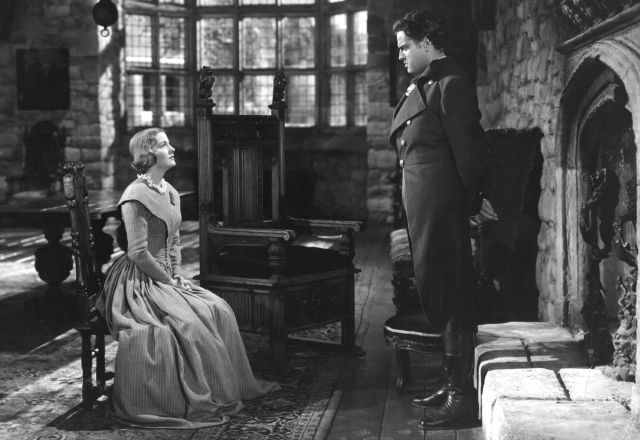Joan Fontaine and Orson Welles in Jane Eyre (1943) Credit: Hulton Archive/Getty Images

Bad men thrive in fiction, as if there weren’t enough in life. The object of desire is usually a monster, although he isn’t called that. He is called, instead, a romantic hero – that means dickhead – and the pages are littered with his crimes: Heathcliff, Rochester, everyone who ever walked into a Mills & Boon novel and negged a woman into bed.
This self-hating genre – it is written, almost exclusively by women and feminine low self-esteem is its engine and its shy subject matter – won’t survive #MeToo. It doesn’t deserve to. But there was a novelist who exposed the monster long ago even if few people read her: Jean Rhys.
Her masterpiece was Wide Sargasso Sea (1966). It is usually called a prequel to Jane Eyre – but it is more important and interesting than that. It demolished Jane Eyre and made it look silly; it looked forwards, through Rhys’s marvellous bitterness, to a time when women were less masochistic. It exposed Jane Eyre as the sexual fantasies of a virgin who dreamed of that never-to-be-found contradiction in love, and realised it so finely that the fantasy is still in print: control of a controlling, vicious man. If the fantasy is definitive, so is the book that murders it.
I love Jane Eyre – who doesn’t? Hilary Mantel calls it a book for lonely children and she is, as ever, bang on. It’s a schoolgirl’s book. Read it after Wide Sargasso Sea and hear the idiocy in your own longings. How could you want Edward Rochester, even in the 1944 film, in which he had Orson Welles’ voice? He destroyed his first wife; after that, his home, Thornfield, was always vulnerable to destruction by fire. It was justice. He was equally awful to the woman Jane thought he was to marry, Blanche Ingram. What would he do to Jane?
The concept of Wide Sargasso Sea is brilliant. It is the autobiography of the first Mrs Rochester – the madwoman in the attic at Thornfield and the most interesting, and underwritten, character in Jane Eyre. In fact, it makes me long for a whole series of novels devoted to minor, or even potential, characters in Jane Eyre, written with a similar cynicism: Mrs Brocklehurst, John Reed, Adele’s mother, the woman St John Rivers would have married had he lived (Rivers the parson and sadist is character worthy of Jean Rhys). But that didn’t happen.
It has become fashionable to label Mrs Rochester as a sort of universal feminine id, a metaphor for female rage, eventually consumed by fire. Rhys had the nerve to flesh her out, and she tells the plausible story of the demolition of a marriage and a woman. Antoinette is born in decline, in Jamaica just after the abolition of slavery. Her family’s estates are rotting; the locals despise them. Her father is a drunk; her mother is mad. When Edward Rochester arrives seeking an heiress, she is riven with sensibility – a novelist’s sensibility, a drunk’s sensibility – and completely open to him. He is transfixed, and then repelled. It’s a short road from ecstatic marriage bed to attic prison – and it all makes sense in Rhys’ hands.
Jane Eyre is a wonderful book; but it is no way plausible. She inherits a fortune? His wife dies by suicide? Really? However, how could it, I thought reading Wide Sargasso Sea for the first time, have been any other way?
Rhys is a mystery to some critics. They do not understand her. How could a woman so gifted – half Welsh, half Creole – have ruined herself? Wouldn’t she have been happier living in Highgate and contributing to obscure literary journals? She could have co-founded the LRB! Few girls who attended the blue-stocking Perse School for Girls in Cambridge – she was sent there from her childhood home in Dominica – went on to become dancing girls, whores or great modernist novelists, as Rhys did. I wish they had.
Rhys wrote four autobiographical novels about absinthe, smoking and pathological isolation in the late 20s and 30s and then nothing until Wide Sargasso Sea because, quite frankly, she was pissed most of the time. She was living in Devon, hiding her unpublished novels under the bed and shouting at people. She was an angry drunk, a brawler who spent time in Holloway prison, a terrible neighbour and a worse mother: she placed her first child, a son, in the orphanage where he later died. All this is easily explained if you understand that Rhys was an alcoholic who sought misery and found it; what is amazing is that she managed to stay sober long enough to write five novels and lived to 89. But she hated herself.
“If I stop writing my life will have been an abject failure,” she wrote. “It is that already to other people. But it could be an abject failure to myself. I will not have earned death.” I would not be as cruel to Rhys as she was to herself, but she earned death on her own terms with Wide Sargasso Sea. She deserves to be a #MeToo heroine. She named Edward Rochester as an abuser of women and blew the founding novel of romance fiction apart. She could do so because she knew more about men than Charlotte Brontë – although she could hardly know less. Thank God they never met.










Join the discussion
Join like minded readers that support our journalism by becoming a paid subscriber
To join the discussion in the comments, become a paid subscriber.
Join like minded readers that support our journalism, read unlimited articles and enjoy other subscriber-only benefits.
Subscribe